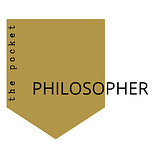Friends,
We’re going to wrap up this relatively dense week with a short maybe even spiritual reflection on knowledge, identity, and being from the Buddha.
In Buddhism, the same concept of flux and the problem of the one and the many that inspired Plato, Aristotle, and Heraclitus deeply inspired the Buddha as well.
Every morning I write an email exploring life through the eyes of the world’s greatest thinkers. Sign up here if you would like to receive it directly in your inbox.
In the larger Buddhist context, these ideas are addressed through anatta. This is the idea that all things are in state of change and are impermanent. In fact, resisting this truth—that everything is changing, nothing is perfect, and nothing holds a central identity in and of itself—leads to suffering.
According to Buddhist tradition, each person is made of 5 “parts,”
The Body
Sensations
Perception
Opinions/Abstract Thoughts
Consciousness/Awareness.
What’s interesting is that we’ve seen these elements addressed in our other study of philosophers throughout the centuries. What’s more, is that within Buddhism there exists a parable extremely similar to Theseus’ Ship. I’ll paraphrase:
A king sought the counsel and wisdom of a monk. The king asked the monk his name, to which the monk replied in confusion that he did not know, as he did not view himself as a singular being to be named. At which point the monk described himself in the same way one would a chariot—the assembled version of parts—which one collectively refers to as a person, but not as an identity (or ego) to be attached to.
Instead of a ship, in this case we consider a chariot made of wheels, spokes, seats, straps, and cushions. Collectively, these parts come together in one space and time and we refer to this collection as a chariot, though it is actually comprised of many things, and is liable to change over time, eventually deteriorating completely.
Thousands of years ago, Buddhist monks were observing and articulating entropy, flux, identity, and the way matter must become more disordered over time!
In this way, Buddhism teaches us not to look at ourselves as something permanent or perfect, but temporary (anatta) and liable to suffering and deterioration. Accepting this truth is one of the first phases in achieving enlightenment.
Weather in this lifetime when our thoughts and skin cells change, or in multiple lifetimes as we are comprised of different elements, the self is constantly in flux. As Heraclitus and Plato noted, one cannot step into the same river—or life—twice.
This leads perfectly into the famous “4 Noble Truths” which speaks directly to Buddhist concepts of identity and knowledge:
Dukkha - All of life is impermanent and involves suffering (flux)
Samudaya - The cause of suffering is greed or possessiveness
Nirodha - Suffering can end
Magga - The way to end suffering is to follow the Noble Eightfold Path
Accepting that life is in flux and our identity is a fluid concept at best, is the ground floor of Buddhist philosophy. I find that impressive and inspirational. Where many philosophers were content simply to observe flux, Buddhist epistemology begins with flux.
And so I’ll leave you with a short synopsis of the Eightfold Path to guide us into a week of self-awareness, and letting go.
Right Action (not harmful to others, acting mindfully)
Right Speech (truth-telling)
Right Livelihood (earning a living in a way that does not cause suffering)
Right Mindfulness (aware of personal and collective emotions)
Right Effort (Effort on right things, like lovingkindness, compassion, and meditation)
Right Concentration (Developing focus for meditation)
Right View (Being mindful of actions' consequences)
Right Intention (Being clear about following this path)
With that, I wish you a wonderful weekend, and we’ll see you next week.
-TPP
Do you know someone who would love TPP, share it here!
References:
https://www.bbc.co.uk/bitesize/guides/zf8g4qt/revision/3
Image:
https://en.wikipedia.org/wiki/Bhavacakra#/media/File:Bhavachakra.jpg















Share this post